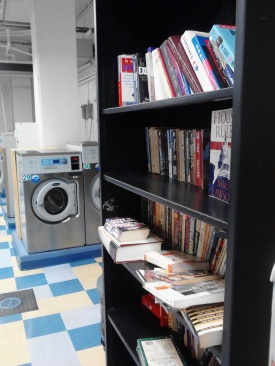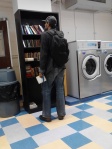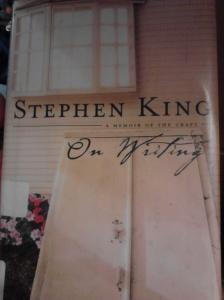
My building’s laundry room has a bookcase where people recycle their previously read material. Books, magazines, newspapers, mail order catalogs—they’re all there. My building has more than a few academics—I’ve seen instructors’ editions of textbooks as well as literary journals—and folks who work in the publishing industry, as evidenced by the many Advance Readers Copies (ARCs) on the shelves. In case you haven’t seen one, the ARC is a paperback mock-up of a book awaiting publication. It may vary slightly from the version ultimately published, and it may lack cover art.
The ARC is of particular interest to collectors when the book remains unpublished, or is steeped in controversy. If this is my lucky day, I might be able to wash my socks and find a literary treasure simultaneously.
I met a neighbor who was shopping the laundry room library. He was laden down with an armful of books.

Was he an avid reader? Was he a second-hand book dealer amassing inventory? We struck up a conversation. He told me he was a writer, and proceeded to regale me with snippets of his previously written poetry, which he could no longer fully remember. He attributed this to mad cow disease, but I think it was from the whiskey. He recited the last line of his novel, which he said he “borrowed” from another writer who was unfamiliar to me.
People have the impression that librarians are voracious readers. In my case, this is not the case. I’m not proud of it, but not embarrassed by it either. It is what it is. Hey, at least I will never be accused of plagiarism (or “borrowing”), because chances are I’ve never read it before.
The writer then told me a story about his youthful escapades with a deceased musician whose name I shall not disclose, since it is his story, not mine. “That is so interesting,” I said. “You should write about it.” The writer said his new novel, about love and loss, indirectly touches on the events. He thought that writing about his friend would be “boring”. He said he only writes when the spirit moves him, and only writes that which gushes forth. I wondered whether his writing erupts like a nose-bleed. Is it a seizure? Does it burst onto the scene like a volcano?
Sure, everyone’s process is different. Some professional writers sit down to write in a special venue; some can do it anywhere. What, you’ve never seen a scribbler on the subway? JK Rowling started writing Harry Potter in a café, but these days I’m sure you won’t find her with a laptop in Starbucks.
People who are enthusiastic about their work talk about it, and writers, being writers, write about it. There are records for 3863 items currently found on WorldCat with the phrase “on writing” as part of their titles. Either writers really enjoy writing about writing, or they are just plumb out of other ideas.
 One book in this category (in fact, the second most popular “on writing” to me in the entire world) is “On writing: A memoir of the craft” by Stephen King. It is on its way to celebrating its fifteenth anniversary although I have only just read it. (Don’t they say better late than never?)
One book in this category (in fact, the second most popular “on writing” to me in the entire world) is “On writing: A memoir of the craft” by Stephen King. It is on its way to celebrating its fifteenth anniversary although I have only just read it. (Don’t they say better late than never?)
To find more of the same, search the LC Subject Heading Authorship. (Ha! I thought the category would be Writers—Memoirs, but those Library of Congress catalogers fooled me again!) Authorship is a broad category that encompasses the profession of writing, and the act of creating the written word. Touro Libraries has 215 books in the area, and if you are interested, we might even get the one by Stephen King.
In the first half of “On writing”, Stephen (I’ll call him Stephen, because now that I read the book we are friends in my head) details the role writing played in his early life. He then explains his writing rules of the road. Stephen believes that to be a good writer you need the basic rules of grammar, a good vocabulary, and copious amounts of reading under your belt. In the epilogue he even provides a reading list. (Thanks, Stephen, I’ll get right on it.) This book is a great inspiration for those with authorial aspirations.
What about those of you who feel writing is a chore, on par with doing laundry? (Not really enjoyable, but on occasion it has to be done.) There are books for you, too. Take a look at any of these:
Vivid and continuous: essays and exercises for writing fiction
A writer’s tool kit: 12 proven ways you can make your writing stronger–today
Writing fitness: practical exercises for better business writing
Books with writing prompts are excellent, because half of writing is getting an idea about what to write. Had I known that “what I did on my summer vacation” was merely a prompt designed to encourage my writing, I would have been less ashamed that there were no summer vacations. Someone should have told me, “This is a writing exercise. Pretend you had a different, better summer vacation. Write five paragraphs about what that would be like.” Someone should have told me to write a page of lies.
So now I’m telling you. You should write. Write about your dead musician friend, or write a page of lies. Stephen King wrote “the scariest moment is always just before you start”. Who knows scary better than Stephen King? My suggestion, (and you know I am talking to you, Sammy!) is that you write a blog entry to be posted here. In order to get you started, I propose the title “What Touro Libraries did for me”. I’d love to read it.
Contributed by: Carol Schapiro, Librarian, Midtown Library




